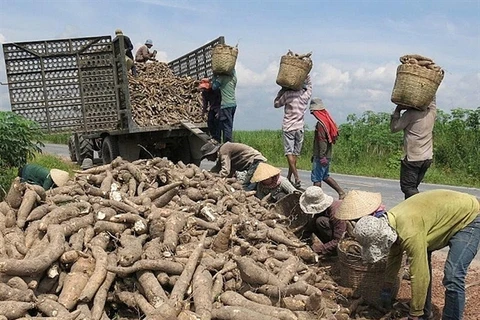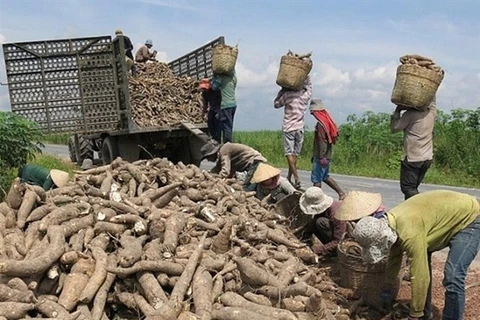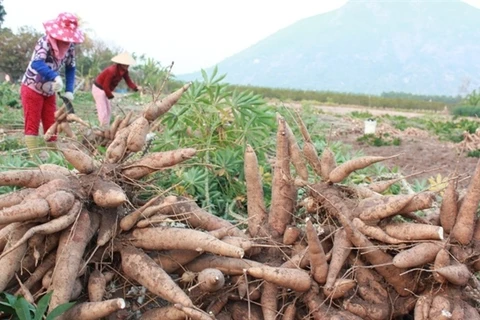 The average export price of Vietnam's cassava and cassava products in 2021 was at 409.8 USD per tonne, up 13.8 percent on year. (Photo:VNA)
The average export price of Vietnam's cassava and cassava products in 2021 was at 409.8 USD per tonne, up 13.8 percent on year. (Photo:VNA) According to Official Letter 632/TCT-TTKT on value-added tax (VAT), the General Department of Taxation directs local tax departments to verify foreign customers during processing procedure relating to VAT, leading to suspension of refund and arrears of VAT for cassava exporters.
The current regulations on VAT arrears do not stipulate that the tax refund dossier must be certified by foreign customers to be eligible for a refund.
The association said that determining the quantity of exported cassava can be done because the businesses must declare the export volume to the customs offices at the border gates. The proceeds from the cassava exports are transferred via the bank. Therefore, the tax authority can completely control the number of cassava exports based on documents at the customs and the bank.
The association believes that if this is implemented, it will bankrupt local cassava enterprises. This dispatch will affect more than 1.2 million workers in the domestic cassava industry. Hundreds of production facilities will have to stop purchasing cassava, causing socio-economic instability in many localities.
At present, the cassava industry is facing many difficulties due to the impact of the COVID-19 pandemic over the past two years. Many businesses no longer have money to buy raw materials from farmers so they are forced to stop production.
Meanwhile, Vietnamese enterprises are also facing fierce export competition with Thailand and Indonesia.
Together with those difficulties, if the VAT refund problem is not resolved, it can lead to the collapse of the production chain.
Vietnam now has about 530,000ha growing cassava, mainly in difficult mountainous areas.
Cassava is a tree with great potential and also is under the list of 13 national key farming products by the Ministry of Agriculture and Rural Development, under the Government's programme on industrialising and modernising the agriculture sector and the rural areas.
In recent years, the export turnover of cassava and cassava products has reached 1.35 billion USD each year, becoming the second-largest cassava exporter in the world, after Thailand.
According to the General Department of Customs, in 2021, Vietnam's export of cassava and cassava products reached 2.87 million tonnes, worth 1.18 billion USD, up 2.4 percent in volume and 16.5 percent in value compared to 2020.
The average export price of Vietnam's cassava and cassava products in 2021 was at 409.8 USD per tonne, up 13.8 percent on the year.
In 2021, China was still the largest market for Vietnam's cassava and cassava products, accounting for 93.6 percent in volume and 92.9 percent in value. The export was 2.69 million tonnes, worth 1.1 billion USD, up 4.1 percent in volume and 18.5 percent in value compared to 2020.
The average export price of Vietnam's cassava and cassava products to China in 2021 stood at 409 USD per tonne, up 13.9 percent compared to 2020.
Experts forecast that China would import more cassava and cassava products from Vietnam due to favourable geographical conditions.
However, more than 65 percent of Vietnam's cassava and cassava products have been exported to China via border gates in Lang Son, Quang Ninh and Lao Cai provinces./.
VNA






















